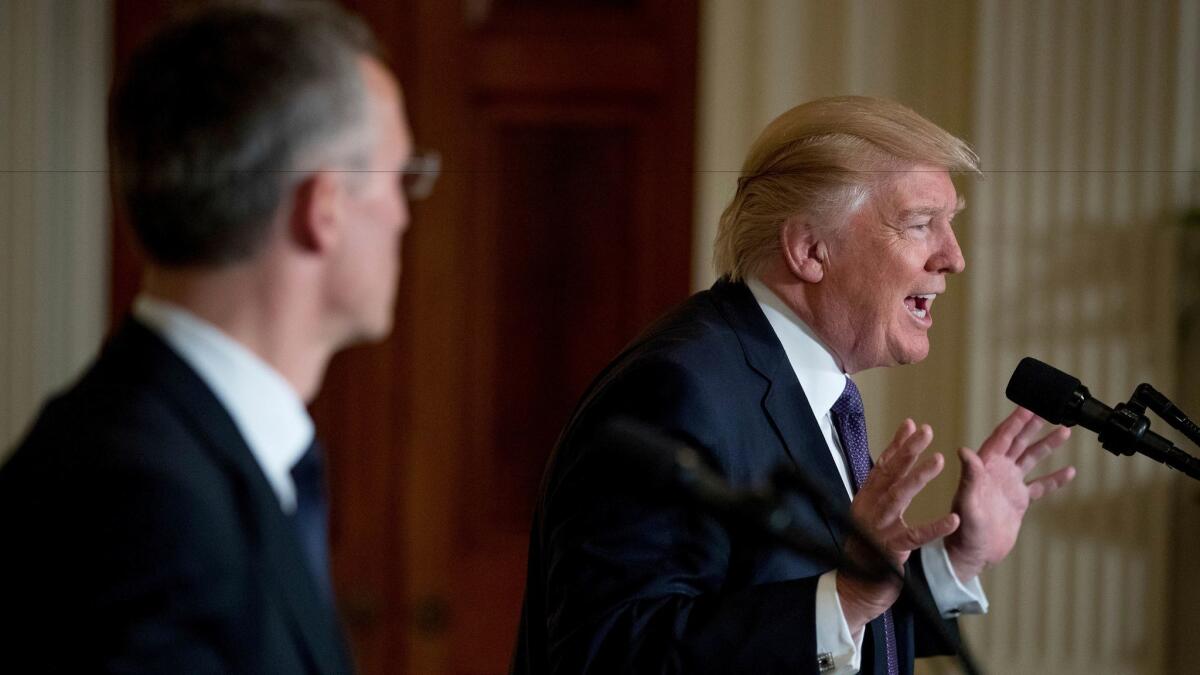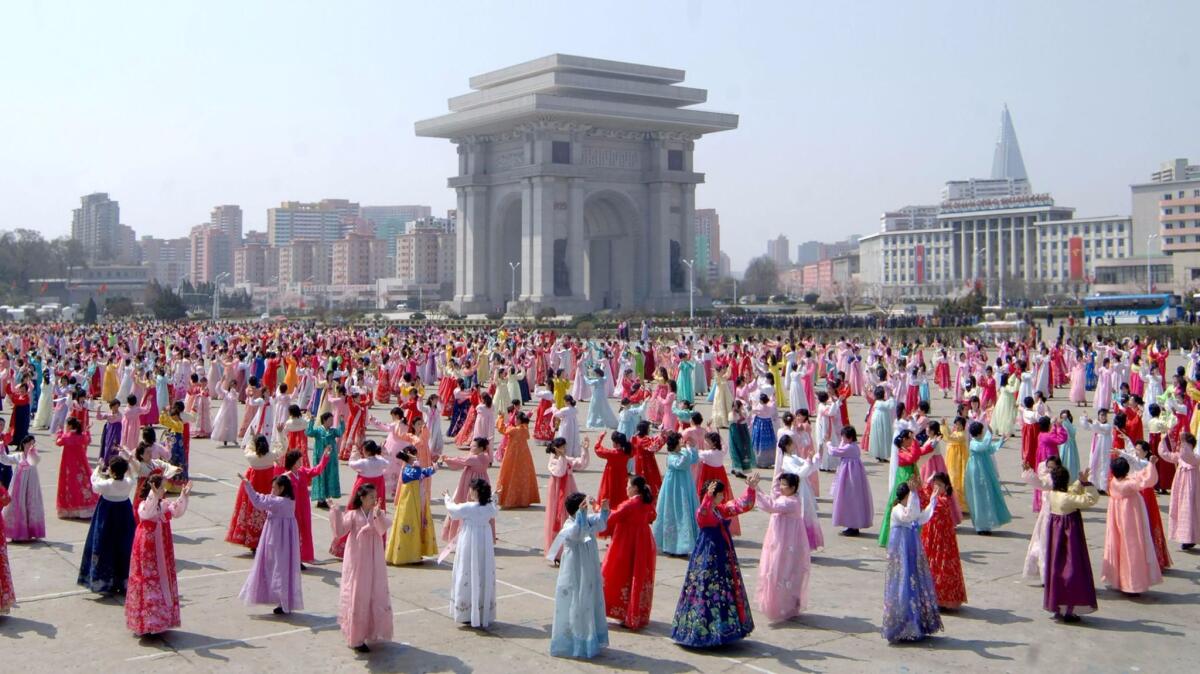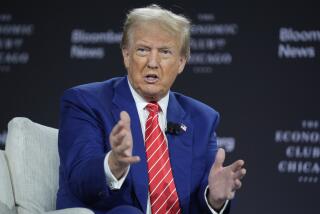Trump to China: Help us rein in North Korea and we’ll back off on trade issues
Reporting from New York — President Trump is willing to make concessions on his signature issue of trade in return for Chinese help reining in North Korea, he told reporters on Wednesday.
The stark about-face in priorities comes at a time when North Korea might be preparing to conduct its sixth nuclear test. A U.S. aircraft carrier, the Carl Vinson, is heading toward the region and is being joined by Japanese warships.
The urgency of the situation was reflected in Trump’s comments to White House reporters Wednesday when he recounted recent conversations with his Chinese counterpart.

“The way you’re going to make a good trade deal is to help us with North Korea, otherwise we’re just going to go it alone,” Trump said he told Chinese President Xi Jinping.
“I think [Xi] means well and wants to help. We’ll see whether he does,” added Trump, speaking during a news conference with NATO Secretary-General Jens Stoltenberg.
Trump spoke Wednesday morning by telephone to the Chinese president, following up on their summit last week at the Mar-a-Lago resort in Florida.
Nervous that the United States might engage in military action, Beijing looked poised to take tougher measures against Pyongyang. Chinese media have hinted the government could withhold fuel oil shipments to North Korea or enforce already tough sanctions against a country that conducts almost all of its trade across its 850-mile border with China.
Beijing was unnerved by the unilateral U.S. airstrikes last week against Syria, punishing President Bashar Assad’s government for its poison gas attacks on civilians, analysts said. The airstrikes were ordered hastily while Xi was visiting Trump in Florida.
“There is widespread concern in Beijing about a U.S. preemptive strike on North Korea,” said Yun Sun, a specialist at the Washington-based Stimson Center who was visiting Beijing last week. “They saw how assertive and unilateral the U.S. action was on Syria, and they know that Trump is serious about North Korea.”
Chinese state media first reported on the telephone call between Trump and Xi, and according to Sun, the subtle wording of the reports indicated heightened Chinese concern about North Korea’s nuclear program.
“China usually emphasizes stability over denuclearization, but this time it was different,” she said.
The Global Times, a state-run Chinese newspaper, also warned in an editorial Wednesday that Beijing would support stiffer action against its historical ally.
“More and more Chinese support the view that the government should enhance sanctions over Pyongyang’s nuclear activities,” the Global Times wrote. “If the North makes another provocative move this month, the Chinese society will be willing to see the [U.N. Security Council] adopt severe restrictive measures that have never been seen before, such as restricting oil imports to the North.”
North Korea often schedules its weapons tests to coincide with symbolic national events. There are fears that it might conduct another nuclear test — which would be its sixth — this week to mark the 105th anniversary of the birth of its founder, Kim Il Sung. A delegation of about 200 foreign journalists visiting Pyongyang has been told it should prepare for a “big and important event” on Thursday.

Since Mao Tse-tung sent troops across the Yalu River in 1950, China has been the main protector of the renegade North Korean government. But it has periodically signaled its displeasure by withholding for brief periods shipments of fuel oil on which energy-starved North Korea is dependent.
Relations have ebbed since 2011 when the third-generation leader, Kim Jong Un, succeeded his father, Kim Jong Il.
The new leader, still in his early 30s, has doubled down on his country’s development of nuclear weapons and missiles. In blustery speeches, he has warned that his country might soon be ready to test an intercontinental ballistic missile capable of reaching the United States.
All that is worrisome to the Chinese Communist Party, which fears a North Korean collapse that could send refugees rushing into China and could bring a reunited, U.S.-dominated Korea to its borders.
With its secretive nature, China seldom acknowledges when it is punishing North Korea, but there are clues. For example, Beijing has blocked delivery of North Korea’s principal export of coal. On April 7, a dozen freight ships that were headed to the North Korean port of Nampo were ordered to turn around.
The Chinese government offered up an implausible explanation that the North Korean quota for coal imports had been exceeded. But many analysts believe it was a response to the constant cajoling and threats emanating from Trump.
Trump has not specified exactly what concessions he has offered China in return for help with North Korea, but frequent reversals have become familiar in the Trump administration. In comments published Wednesday in the Wall Street Journal, Trump said he had decided not to label China as a currency manipulator, despite promises to do so during last year’s presidential campaign.
In his news conference with Stoltenberg, he also backed away from his earlier criticism of the North Atlantic Treaty Organization as obsolete.
With North Korea, Trump had earlier suggested he would be willing to meet directly with Kim Jong Un, and back-channel talks were scheduled this year. But that fell apart after Kim was implicated in the dramatic assassination of his half brother Kim Jong Nam, who was poisoned with VX gas in Malaysia.
“I can’t figure out the Trump administration strategy. They are trying to feel their way to a policy,” said Joel Wit, a senior fellow at the U.S.-Korea Institute at Johns Hopkins University. “They seem to think now they can find some common ground with China.”
Staff Writer Laura King in Washington contributed to this report.
ALSO
Can the U.S. defend against a North Korean missile strike?
In China, the United Airlines incident unleashes frustration about treatment of Asians in America
Trying to keep up with the latest Trump news? Some stories you should pay attention to
More to Read
Sign up for Essential California
The most important California stories and recommendations in your inbox every morning.
You may occasionally receive promotional content from the Los Angeles Times.










